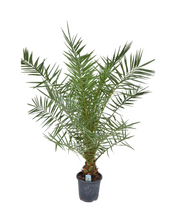
Phoenix canariensis, commonly known as the Canary Island date palm, is a majestic and iconic palm tree prized for its striking appearance and imposing size. This palm features a thick, fibrous trunk topped with a crown of long, feathery, arching fronds that can reach up to 6 metres (20 feet) in length. It's a popular choice for landscaping in warm climates, adding a touch of tropical elegance to gardens, parks, and avenues. It belongs to the Arecaceae family.
Origin: As its name suggests, Phoenix canariensis is native to the Canary Islands.
Light: Phoenix canariensis thrives in full sun. It prefers at least 6-8 hours of direct sunlight per day to encourage strong growth and maintain its vibrant green colour.
Water: Water regularly, especially during hot, dry periods. Allow the soil to dry out slightly between waterings, but avoid letting it dry out completely. Young palms, in particular, benefit from consistent moisture.
Soil: Phoenix canariensis prefers well-drained soil. It can tolerate a range of soil types, but thrives in fertile, loamy soil.
Fertilising: Feed your Phoenix canariensis with a slow-release palm fertiliser in spring and summer.
Temperature: Phoenix canariensis is relatively hardy and can tolerate temperatures down to -6°C (21°F) for short periods. However, it prefers warm temperatures and thrives in subtropical and tropical climates.
Pruning: Remove any dead or dying fronds to maintain a tidy appearance. Be cautious when pruning, as the sharp edges of the fronds can cause cuts.
Growth Habit: Phoenix canariensis is a slow-growing palm that can eventually reach a height of 10-20 metres (33-66 feet).
Uses: Phoenix canariensis is primarily grown as an ornamental plant. Its dates are edible but not as sweet or commercially significant as those of other date palm species.
Toxicity: Phoenix canariensis is not known to be toxic to humans or pets. However, the sharp spines on the leaf bases can cause injury, so it's best to handle it with care.








